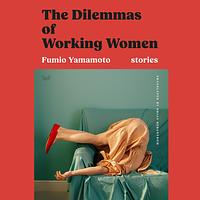You need to sign in or sign up before continuing.
Take a photo of a barcode or cover
reflective
Plot or Character Driven:
Character
Loveable characters:
Complicated
Flaws of characters a main focus:
Yes
Loved every single story without fail. Kept thinking 'This one is my favorite, no wait this one's my favorite' every story I read. All of our female protagonists were so relatable to me & I could sympathize with every single one even as they seemly self sabotaged their own lives. It's hard to be forced to work to survive on the planet you were unwillingly born in. Sometimes all you want is to be unemployed & enjoy life calm & unbothered - yet everyone around you will inevitably have something nasty to say about it.
I think Sumie is definitely my favorite character - I found myself hating and envying her at the same time.
Lot's of catharsis to be felt in this one. Also def one of the better translations I've ever read. Nothing felt weirdly phrased or clunky.
Also Maison Ikkoku is peak.
I think Sumie is definitely my favorite character - I found myself hating and envying her at the same time.
Lot's of catharsis to be felt in this one. Also def one of the better translations I've ever read. Nothing felt weirdly phrased or clunky.
Also Maison Ikkoku is peak.
Moderate: Cancer
Minor: Medical content, Sexual harassment
mysterious
slow-paced
Plot or Character Driven:
Character
Strong character development:
Complicated
Loveable characters:
Complicated
Diverse cast of characters:
Complicated
Flaws of characters a main focus:
Complicated
This work of fiction showcases the ongoing issues of working women in Japan face as they navigate life employed/unemployed.
These short stories highlight the inner turmoil of “demanding” women deal with it in and out of the workforce and how men focused society still is. When reading about each woman, one can see how the male characters behavior towards the woman changes based on their employment status.
I found I had a hard time getting into this book but once I got 30% in I really became connected to the characters. The short stories helped keep me engaged.
Thank you to NetGalley for this arc in exchange for an honest review.
These short stories highlight the inner turmoil of “demanding” women deal with it in and out of the workforce and how men focused society still is. When reading about each woman, one can see how the male characters behavior towards the woman changes based on their employment status.
I found I had a hard time getting into this book but once I got 30% in I really became connected to the characters. The short stories helped keep me engaged.
Thank you to NetGalley for this arc in exchange for an honest review.
dark
reflective
sad
medium-paced
Plot or Character Driven:
Character
Strong character development:
Complicated
Loveable characters:
Complicated
Diverse cast of characters:
N/A
Flaws of characters a main focus:
Yes
emotional
hopeful
reflective
sad
medium-paced
Plot or Character Driven:
Character
Strong character development:
Complicated
Loveable characters:
Complicated
Diverse cast of characters:
No
Flaws of characters a main focus:
Yes
adventurous
dark
emotional
reflective
sad
tense
medium-paced
Plot or Character Driven:
Character
Strong character development:
Complicated
Loveable characters:
Yes
Diverse cast of characters:
Yes
Flaws of characters a main focus:
Yes
challenging
emotional
reflective
medium-paced
Plot or Character Driven:
A mix
Strong character development:
Yes
Loveable characters:
Complicated
Diverse cast of characters:
Yes
Flaws of characters a main focus:
Complicated
Wonderful slice-of-life contemporary stories about women and work, set in Japan. The stories are so relatable and contemplative - they are simple stories with complex emotions. I feel that a lot of women in the modern world are experiencing similar thoughts and challenges about the workplace and society depicted in these stories - it is not a surprise me to me that some of these are based on real references! I also think the women in the stories process their thoughts and feelings about life’s difficulties in a dynamic way that still allows them agency in their lives. Although Japan , this known as a patriarchal society, this work is refreshingly feminist.
From the first story about the newly divorced, burnt out woman who now just wants to make stuffed animals all day (me too, girl) to the story of a lady recovering from cancer and wants to come back in the next life as a planarian, all the stories have a lot of introspection and intention.
I usually provide a leeway for translated lit, since there are always things that cannot be translated but no need to be wary on this point - this book is very well written and translated.
Special thanks to HarperVia and NetGalley for providing an eARC in exchange for an honest, independent review.
From the first story about the newly divorced, burnt out woman who now just wants to make stuffed animals all day (me too, girl) to the story of a lady recovering from cancer and wants to come back in the next life as a planarian, all the stories have a lot of introspection and intention.
I usually provide a leeway for translated lit, since there are always things that cannot be translated but no need to be wary on this point - this book is very well written and translated.
Special thanks to HarperVia and NetGalley for providing an eARC in exchange for an honest, independent review.
dark
reflective
slow-paced
A Naoki Prize-winning short story collection of five stories about feelings around women and unemployment.
Originally titled Planaria when published in Japan in 2000, The Dilemmas of Working Women includes five slice-of-life stories following ordinary people.
Each story pulls you into the narrator’s inner world where each character carries a different burden: from unemployment to breast cancer to the expectations of a patriarchal society, these stories follow the everyday life of different women and society's perceptions of unemployment.
While they explore the complicated, mundane aspects of being human, when you come to the end it feels like there is no conclusion. Nothing necessarily happens, and you are given a lot to ponder - which is what I find captivating.
Thank you to HarperVia on NetGalley for the ARC.
Originally titled Planaria when published in Japan in 2000, The Dilemmas of Working Women includes five slice-of-life stories following ordinary people.
Each story pulls you into the narrator’s inner world where each character carries a different burden: from unemployment to breast cancer to the expectations of a patriarchal society, these stories follow the everyday life of different women and society's perceptions of unemployment.
While they explore the complicated, mundane aspects of being human, when you come to the end it feels like there is no conclusion. Nothing necessarily happens, and you are given a lot to ponder - which is what I find captivating.
Thank you to HarperVia on NetGalley for the ARC.
4/5 ⭐️
"how hard would you have to work to make enough to never have to work again?"
told through different short stories, the dilemmas of working women highlights how women in japan navigate their lives as being apart of working society, whether they're still working or not.
these stories highlight the loneliness and frustrations these "bossy" and "difficult" women have, and the pressure of getting their lives back together in a world that still prioritizes men. it focuses more on their personal lives, how impacted they were by their working hours, and how the men in their lives treat them as a result of their working situations
"and truly, the life we'd needed up leading had been lonely. pushing harder and harder to get ahead, to climb higher and higher, i'd devised a way of life for us that had no room for distraction or even emotion- once he stopped believing in it, what else did i have to offer?"
although it was published in 2000 in japan, i loved reading the stories behind the women and how relevant they still are three decades later.
"it was the human condition to stumble and fall, to get hurt, and then to heal and get up again to fight another day. and i hated it. at some point, i'd begin to despise the very capacity of my heart and body to heal itself and move on."
thank you HarperVia for allowing me to read this book through Netgalley!
"how hard would you have to work to make enough to never have to work again?"
told through different short stories, the dilemmas of working women highlights how women in japan navigate their lives as being apart of working society, whether they're still working or not.
these stories highlight the loneliness and frustrations these "bossy" and "difficult" women have, and the pressure of getting their lives back together in a world that still prioritizes men. it focuses more on their personal lives, how impacted they were by their working hours, and how the men in their lives treat them as a result of their working situations
"and truly, the life we'd needed up leading had been lonely. pushing harder and harder to get ahead, to climb higher and higher, i'd devised a way of life for us that had no room for distraction or even emotion- once he stopped believing in it, what else did i have to offer?"
although it was published in 2000 in japan, i loved reading the stories behind the women and how relevant they still are three decades later.
"it was the human condition to stumble and fall, to get hurt, and then to heal and get up again to fight another day. and i hated it. at some point, i'd begin to despise the very capacity of my heart and body to heal itself and move on."
thank you HarperVia for allowing me to read this book through Netgalley!
reflective
medium-paced
Plot or Character Driven:
A mix
Strong character development:
Complicated
Loveable characters:
Complicated
Diverse cast of characters:
N/A
Flaws of characters a main focus:
Yes
funny
reflective
slow-paced
Plot or Character Driven:
Character
Strong character development:
No
Loveable characters:
No
Diverse cast of characters:
No
Flaws of characters a main focus:
Yes





